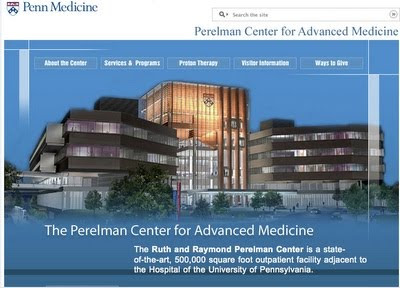 When life moves off the track you know to unfamiliar terrain, betting with the best is the only way to go. Research, deliberate, and then insist on the best. Following my own advice, I have carefully selected my caregivers and I have been well pleased, not an easy place to achieve with my acute standards. For those of you who are familiar with the University of Pennsylvania Health System, I am in the West Pavilion in Penn Medicine Center. This wing locates me as a cancer patient, and someone who is interested in exploring traditional and alternative treatments, including clinical trials and experimental therapies, if deemed necessary. Specifically, my husband and I are in the Abramson Cancer Center, Perelman Center for Advanced Medicine, meeting with Sunita Nasta, MD, an oncology-hematology specialist with interests in Non-/Hodgkins Lymphoma, Leukemia, and Bone Marrow Transplants.
When life moves off the track you know to unfamiliar terrain, betting with the best is the only way to go. Research, deliberate, and then insist on the best. Following my own advice, I have carefully selected my caregivers and I have been well pleased, not an easy place to achieve with my acute standards. For those of you who are familiar with the University of Pennsylvania Health System, I am in the West Pavilion in Penn Medicine Center. This wing locates me as a cancer patient, and someone who is interested in exploring traditional and alternative treatments, including clinical trials and experimental therapies, if deemed necessary. Specifically, my husband and I are in the Abramson Cancer Center, Perelman Center for Advanced Medicine, meeting with Sunita Nasta, MD, an oncology-hematology specialist with interests in Non-/Hodgkins Lymphoma, Leukemia, and Bone Marrow Transplants. The University of Pennsylvania has a long and well-established history as forerunners and innovators in medical science at all levels or medical care. William Pepper, Jr., MD (1843-1898), the third in the family line of physicians in the early history of the hospital, spearheaded major early development and expansion. A Laboratory of Hygiene, the University Library, University Museum, William Pepper Laboratory of Clinical Medicine, Veterinary School, Wharton School of Business and Commerce, School of Nursing, ad Wistar Institute of Anatomy and Biology, as well as several expansions of the hospital occurred under his spirited creation.
The University of Pennsylvania has a long and well-established history as forerunners and innovators in medical science at all levels or medical care. William Pepper, Jr., MD (1843-1898), the third in the family line of physicians in the early history of the hospital, spearheaded major early development and expansion. A Laboratory of Hygiene, the University Library, University Museum, William Pepper Laboratory of Clinical Medicine, Veterinary School, Wharton School of Business and Commerce, School of Nursing, ad Wistar Institute of Anatomy and Biology, as well as several expansions of the hospital occurred under his spirited creation. A milestone in radiology, including the world's first X-ray, produced here in 1890, as well as a leader in radiation oncology, cancer care and cures, and nursing education and excellence, the University of Pennsylvania Medical Health System is simply the best. That's why I am HERE. I want the best facility, the best physicians, the best equipment, the best treatment! It is critical in your diagnosis, treatment, and cancer care to make informed choices. Decide criteria for what constitutes best for you. That could include simply wanting the best diagnostician, surgeon, hematologist, radiologist, oncologist, but best includes a wide array of other emotional factors. My comfort zone one year ago centered in a small country hospital with the best compassionate care. Many physicians also practiced at a larger city hospital, but dedicated a smaller practice to my area of rural America, so I had the best of both worlds. Best may be a collaborative doctor who engages you in decision-marking (always my choice), or you may prefer a medical professional who directs your treatment with minimal input from you, perhaps making your journey just a bit less stressful. Best is individual, relative, and always your perception, so bet on your best.
A milestone in radiology, including the world's first X-ray, produced here in 1890, as well as a leader in radiation oncology, cancer care and cures, and nursing education and excellence, the University of Pennsylvania Medical Health System is simply the best. That's why I am HERE. I want the best facility, the best physicians, the best equipment, the best treatment! It is critical in your diagnosis, treatment, and cancer care to make informed choices. Decide criteria for what constitutes best for you. That could include simply wanting the best diagnostician, surgeon, hematologist, radiologist, oncologist, but best includes a wide array of other emotional factors. My comfort zone one year ago centered in a small country hospital with the best compassionate care. Many physicians also practiced at a larger city hospital, but dedicated a smaller practice to my area of rural America, so I had the best of both worlds. Best may be a collaborative doctor who engages you in decision-marking (always my choice), or you may prefer a medical professional who directs your treatment with minimal input from you, perhaps making your journey just a bit less stressful. Best is individual, relative, and always your perception, so bet on your best.Sunista Nasta, MD
University of Pennsylvania Health System
Abramson Cancer Center
Perelman Center for Advanced Medicine
Oncology
Follicular Lymphoma
Lymphoma

![Reblog this post [with Zemanta]](http://img.zemanta.com/reblog_e.png?x-id=40ae04a4-d40a-481a-8aee-1afcefb4b6f4)
Very Inspirational,Thanks for sharing
ReplyDeleteHome Care Services San Leandro